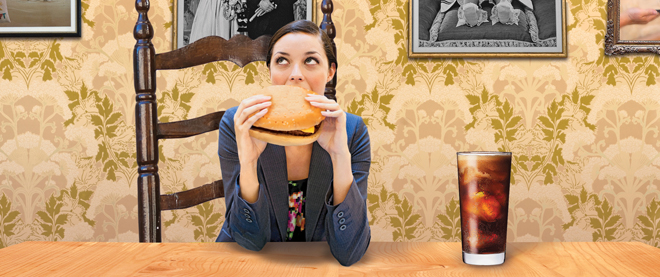Big portions weigh down small women
Petites who overeat by just 28 calories a day could gain 30 lb. in a decade
Getty Images; iStock; Photo illustration by Sarah Mackinnon
Share

“Have you ever wondered why they make clothes for petite women but not food?” asks fitness expert Jim Karas in a new book that’s specifically written for women five foot four and under.
The Petite Advantage Diet is aimed at shorter women who are wondering, in frustration, why regular diets don’t work for them.
“Petite women can’t eat like the big girls,” Karas tells Maclean’s from his office in Chicago, where he’s been personal trainer to celebrities like Diane Sawyer, Hugh Jackman and Oprah Winfrey’s best friend, Gayle King.
With the release of The Petite Advantage Diet, “women are looking at me like I’m the second coming,” he says. “They’re saying, ‘Oh my God! I always knew there was something different! None of these other programs is working for me.’ It’s an interesting sense of urgency for this book. In the United States, 47 million women are five foot four and under. There are tens of millions of women in the U.S. and Canada who are falling into this category.”
Karas estimates petite women who overeat by as few as 28 calories a day will gain 30 lb. a decade. “That’s 90 lb. after three decades! Does that sound like the way your weight has slowly crept up?”
On a positive note, “petites possess stronger muscles in proportion to body weight, which translates into faster reaction times, greater endurance, minimal joint pain and the ability to work out harder and more safely,” he writes. “There is also startling research demonstrating that petites live longer, and even possess a gene linked to longevity. Don’t you just feel sorry for the stressed-out, pumping hearts of those long, ‘leggy’ runway models?”
For petites to lose weight, Karas recommends reducing calories to 1,100 a day for two days; on the third day, calories increase to 1,600. This is “calorie cycling,” as he calls it. “I’ve found that giving women the opportunity of a little treat along the way made their adherence to the regular days so much better.”
Karas’s program calls for exercise, but only a bit more than 90 minutes a week, and skip the cardio. “I’ve been the anti-cardio man for almost five years now. Totally and unequivocally, cardio just makes you hungry, and if you are a petite woman and you start eating like bigger women after you’ve done cardio, there is no place your weight is going to go but up.”
Strength training is the way to go. And don’t forget to stand up and move around as much as possible. “Don’t think of this specifically as ‘exercise,’ but rather as daily movement that comes from cleaning the house, gardening, walking to the bus, shopping, cooking or standing while talking on the phone.”
Karas insists that petite women take three grams of a fibre supplement 15 minutes before dinner each night. “For years, petites have told me about their issues with irregularity. I theorize that their smaller size makes this more of an issue. Most petites don’t even know what it feels like to be regular, which I describe as having at least one or two bowel movements each day. Especially as a petite, I want to lean you out in the mid-section. We are going for that tight hourglass figure. Regularity will lead to a more efficient metabolism.”
In his experience, eating your biggest meal of the day at breakfast, or “front loading,” as he calls it, is another must. The 1,100-calorie-a-day allocation breaks down to a meagre 400 calories for breakfast, 300 calories for lunch and 300 calories for dinner (and a 100-calorie snack). “If you don’t plan to eat breakfast, then you are destined to stay at your present weight—and then some.”
Karas pulls no punches when it comes to the maintenance phase, otherwise known as keeping the weight off. “There is very little difference between what you need to do to lose the weight and what you need to do to keep it off. That’s the unspoken truth you rarely hear from people in my industry. Nobody says that. They’re afraid it discourages people. They want to say, ‘It’s a three-week diet and then you can go back to enjoying what you want.’ Totally, totally untrue.”